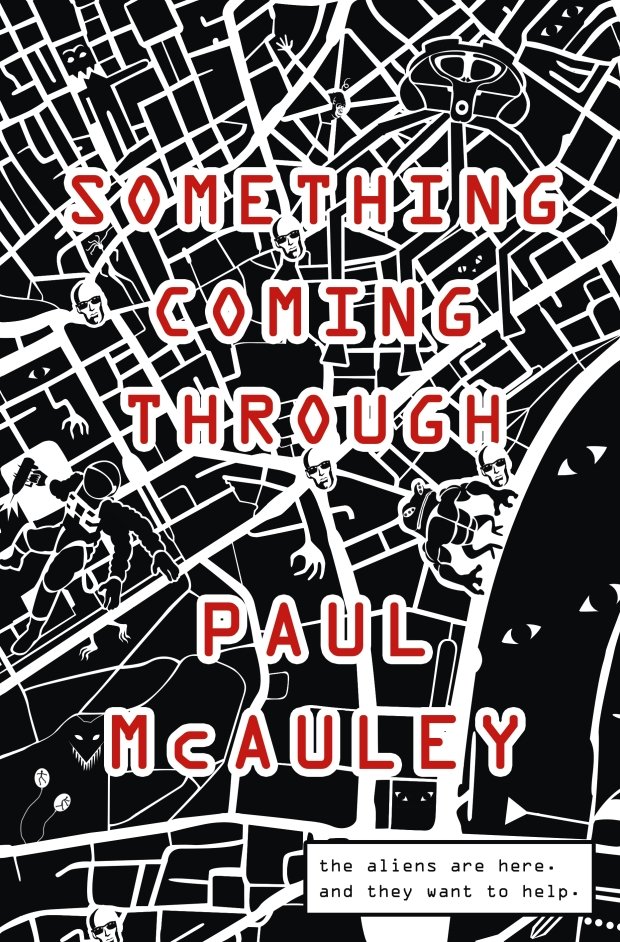Why you can trust GamesRadar+

Release Date: 19 February 2015
384 pages | Hardback/ebook
Author: Paul McAuley
Publisher: Gollancz
British author Paul McAuley has long been a critical darling. His backlist comes with a host of awards – the Philip K Dick, the Arthur C Clarke, the John W Campbell, the Sidewise, the British Fantasy – and this new novel itself grows out of an award-winning short story.
McAuley’s major work over the past half-decade has been the Quiet War series, hailed for its reimagining of the science fictional solar system, based on findings from recent space-bound probes. The end of that sequence, though, signalled a return to Earth and more immediate concerns. “The Choice”, published in US zine Asimov’s in February 2011, took up this theme: it’s set in a near-future UK reeling from climate change, visited by aliens offering to help.
Nothing, of course, is as simple as it seems: McAuley described Something Coming Through on his blog as an exploration of “the strangeness of incipient futurity turned up to 11”, and so it proves. Set 13 years after the arrival of the aliens, known as the Jackeroo, it’s a powerful examination of both the physical effects of the alien tech and the psychological legacy of first contact on an already damaged human society.
The consequences of the alien tech have been unpredictable and not wholly successful: creatures introduced to combat pollution have turned into invasive species; alien artefacts have changed people physically and mentally, causing them to see “ghosts” or speak in tongues. “Ever since First Contact,” says one character, “our minds have been altered by alien memes and ideations”. In a way that echoes the legacy of first-world meddling (both imperialist and more well-meaning) on the fates of poorer nations, humanity is at the mercy of cultural forces it can’t control; for every problem the tech solves, a new one is created.
The novel tells two intertwined stories in alternating chapters. In the first, Chloe Millar, agent of a corporation that collects fragments of Jackeroo technology, dodges political separatists, shady police and social media opprobrium as she hunts an orphaned child with an uncanny insight into the landscape of an alien planet. In the second, Vic Gayle, a detective living on Mangala – one of several habitable worlds gifted to humanity by the Jackeroo – investigates the murder of a recent immigrant from Earth.
The storytelling style is punchy, thoughtful, and sometimes playful. Vic’s half, in particular, has fun with crime drama touchstones: Vic repeatedly calls himself “a murder police”, recalling The Wire, Mangala’s criminal bosses have the air of Guy Ritchie gangsters about them (and one is a fan of Revolver), and a minor character called Mikkel Madsen represents the Scandinavians. But alongside the chase sequences, investigations both conventional and unconventional, and sometimes brutal violence, the novel is grounded by a host of dusty, grimy detail that makes both its worlds feel lived in, and elevated by a focus on the bigger questions behind its scenario. Are the Jackeroo’s intentions and methods benevolent? Does “benevolence”, as humans understand it, have any meaning when applied to extra-terrestrials? And what does being shepherded by aliens ultimately mean for humanity’s moral character and free will? The plot puts these questions into action in enjoyably subversive ways: faced with technology that manipulates its users’ psyches, it’s increasingly difficult for the characters to be sure how much agency they really have. Are they the heroes of their own stories, or just pawns being made to think they’re heroes?
All this, and a fast-paced crime thriller too. McAuley’s latest is smart, it’s challenging, and as an exploration of the social consequences of sudden science fictional change, it’s very impressive indeed.
Nic Clarke


